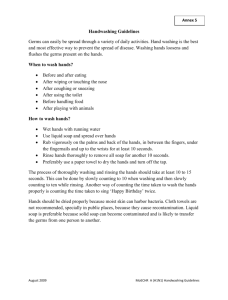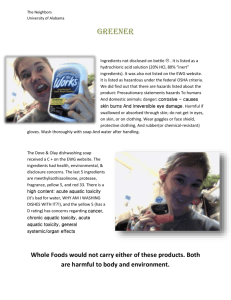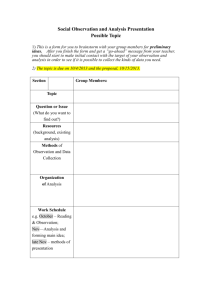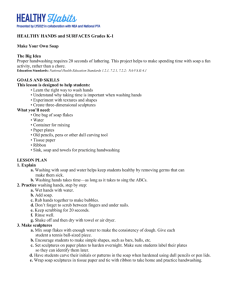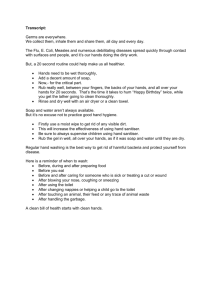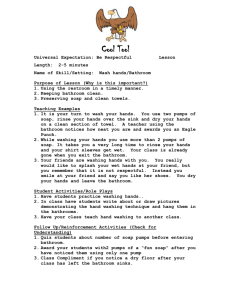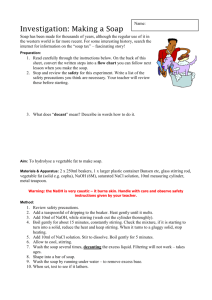Hand Washing BA Questionnaire
advertisement
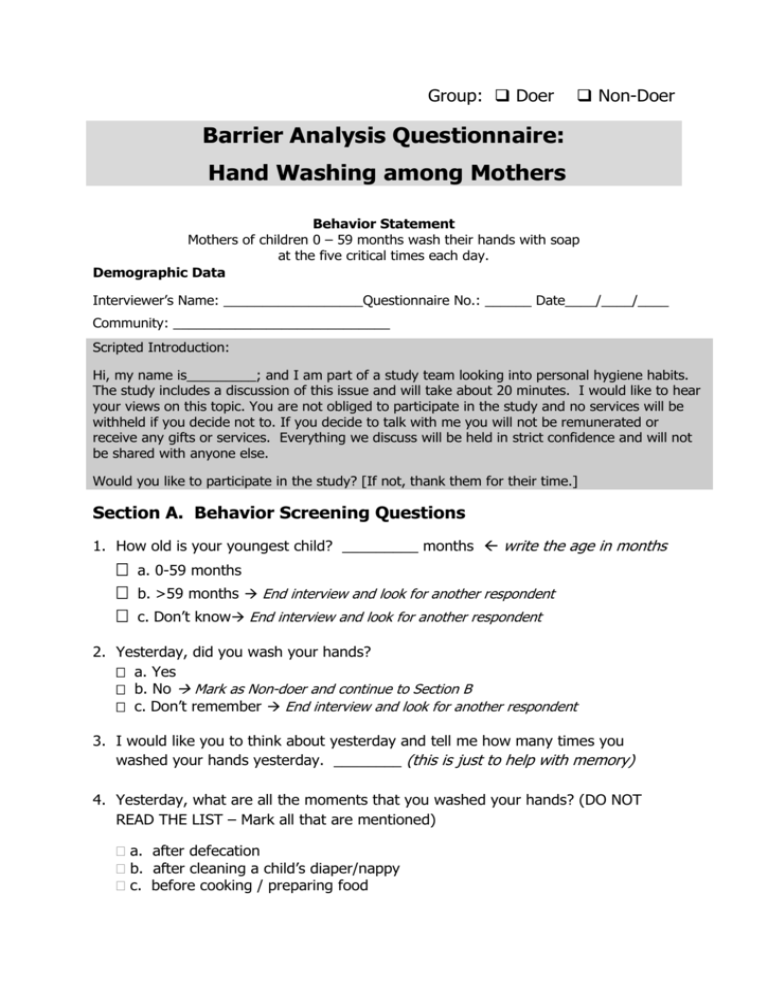
Group: Doer Non-Doer Barrier Analysis Questionnaire: Hand Washing among Mothers Behavior Statement Mothers of children 0 – 59 months wash their hands with soap at the five critical times each day. Demographic Data Interviewer’s Name: __________________Questionnaire No.: ______ Date____/____/____ Community: ____________________________ Scripted Introduction: Hi, my name is_________; and I am part of a study team looking into personal hygiene habits. The study includes a discussion of this issue and will take about 20 minutes. I would like to hear your views on this topic. You are not obliged to participate in the study and no services will be withheld if you decide not to. If you decide to talk with me you will not be remunerated or receive any gifts or services. Everything we discuss will be held in strict confidence and will not be shared with anyone else. Would you like to participate in the study? [If not, thank them for their time.] Section A. Behavior Screening Questions 1. How old is your youngest child? _________ months write the age in months a. 0-59 months b. >59 months End interview and look for another respondent c. Don’t know End interview and look for another respondent 2. Yesterday, did you wash your hands? a. Yes b. No Mark as Non-doer and continue to Section B c. Don’t remember End interview and look for another respondent 3. I would like you to think about yesterday and tell me how many times you washed your hands yesterday. ________ (this is just to help with memory) 4. Yesterday, what are all the moments that you washed your hands? (DO NOT READ THE LIST – Mark all that are mentioned) a. after defecation b. after cleaning a child’s diaper/nappy c. before cooking / preparing food d. before eating e. before feeding a child f. Don’t know or won’t say End interview and look for another respondent 5. In addition to water, did you use anything else to wash your hands yesterday? a. Yes b. No Mark as Non-doer and continue to Section B c. Don’t remember End interview and look for another respondent 6. In addition to water, what else did you use to wash your hands? a. Soap b. Anything else Mark as Non-doer and continue to Section B c. Don’t know/refused to answer End interview and look for another respondent 7. May I see the soap that you use? a. Soap available and looks used b. Soap available but does not look used Mark as Non-doer and continue to Section B c. No soap available Mark as Non-doer and continue to Section B Doer Non Doer Do not Interview (all of the following) (any one of the following) (any one of the following) Question 1 - A Question 2 - A Question 4 - A plus any two from B, C, D, E1 Question 5 – A Question 6 – A Question 7-A Question 2 – B Question 4 – No A; or A and only one other response between B, C, D, E Question 5 – B Question 6 - B Question 7- B or C GROUP: DOER Question 1 -C Question 2 – C Question 4 -C Question 5 - C Question 6 - C NON-DOER Behavior Explanation: In the following questions I am going to be talking about hand washing at five critical times. By this I mean 1. after defecation, 2. after changing a baby’s diaper/nappy, 3. before cooking, 4. before eating and 5. before feeding a child. Section B – Research Questions (Perceived Self-efficacy) 1. With your current knowledge, skills and resources do you think you can wash your hands with soap at the five critical times? 1 This is an example of how to relax a behavior when you don’t think you’ll be able to find enough ‘Doers’. a. Yes b. No c. Maybe d. Don’t know/ Won’t say Doers: What makes it easier for you to wash your hands with soap at the five critical times each day. 2b. Non-doers: What would make it easier for you to wash your hands with soap at the five critical times each day. (Write all responses below. Probe with “What else?”) 2a. (Perceived Self-efficacy) 3a. Doers: What makes it difficult for you to washing your hands with soap at the five critical times each day. 3b. Non-doers: What would make it difficult for you to washing your hands with soap at the five critical times each day. (Write all responses below. Probe with “What else?”) (Perceived Positive Consequences) 4a. Doers: What are the advantages of washing your hands with soap at the five critical times each day? 4b. Non-doers: What would be the advantages of washing your hands with soap at the five critical times each day? (Write all responses below. Probe with “What else?”) (Perceived Negative Consequences) 5a. Doers: What are the disadvantages of washing your hands with soap at the five critical times each day? 5b. Non-doers: What would be the disadvantages of washing your hands with soap at the five critical times each day? (Write all responses below. Probe with “What else?”) (Perceived Social Norms ) 5a. Doers: Who are the people that approve of you washing your hands with soap at the five critical times each day. 5b. Non-doers: Who are the people that would approve of you washing your hands with soap at the five critical times each day. (Write all responses below. Probe with “Who else?”) (Perceived Social Norms ) 6a. Doers: Do most of the people that you know approve of you washing your hands with soap at the five critical times each day? 6b. Non-doers: Would most of the people that you know approve of you washing your hands with soap at the five critical times each day? a. Yes b. Possibly c. No d. Don’t Know / Won’t say (Perceived Social Norms ) 7a. Doers: Who are the people that disapprove of you washing your hands with soap at the five critical times each day. 7b. Non-doers: Who are the people that would disapprove of washing your hands with soap at the five critical times each day. (Write all responses below. Probe with “Who else?”) (Perceived Access) 8a. Doers: How difficult is it to get the soap you need to wash your hands at the five critical times each day? Would you say it is very difficult, somewhat difficult or not difficult at all? 8b. Non-doers: How difficult would it be to the water soap needed to wash your hands at the five critical times each day? Would you say it is: Very difficult, somewhat difficult, not difficult at all? a. Very difficult b. Somewhat difficult c. Not difficult at all. (Perceived Cues for Action / Reminders) 9a. Doers: How difficult is it to remember to wash your hands with soap at the five critical times each day? Very difficult, somewhat difficult, or not difficult at all? 9b. Non-doers: How difficult do you think it would be to remember to wash your hands with soap at the five critical times each day? Very difficult, somewhat difficult, or not difficult at all? a. Very difficult b. Somewhat difficult c. Not difficult at all. d. Don’t Know / Won’t say (Perceived Susceptibility / Perceived Risk) 10. Doers and Non-doers: How likely is it that your child will get diarrhea in the coming 3 months ? Very likely, somewhat likely, or not likely at all? a. Very likely b. Somewhat likely c. Not likely at all (Perceived Severity) 11. Doers and Non-doers: How serious would it be if your child got diarrhea? A very serious problem, somewhat serious problem, or not serious at all? a. Very serious problem b. Somewhat serious problem c. Not serious at all (Action Efficacy) 12. Doers and Non-doers How likely is it that your child will suffer from diarrhea if you wash your hands with soap at the five critical times each day? Very likely, somewhat likely, not very likely? a. Very likely b. Somewhat likely c. Not likely at all (Perception of Divine Will) 13a. Doers and Non-doers: Do you think that it’s God will that children get diarrhea? a. Yes b. No c. Don’t Know / Won’t say (Culture) 14. Doers and Non-doers: Are there any cultural rules or taboos against washing your hands with soap at the five critical times each day. ? a. Yes b. No c. Don’t Know / Won’t say (Policy) 15. Doers and Non-doers : Are there any community laws or rules in place that make it more likely that you wash your hands with soap at the five critical times each day. a. Yes b. No c. Don’t Know / Won’t say [Now I am going to ask you a question unrelated to hand washing.] (Universal Motivators) 16. Doers and Non-doers: What is the one thing that you desire most in life? THANK THE RESPONDENT FOR HIS OR HER TIME!
